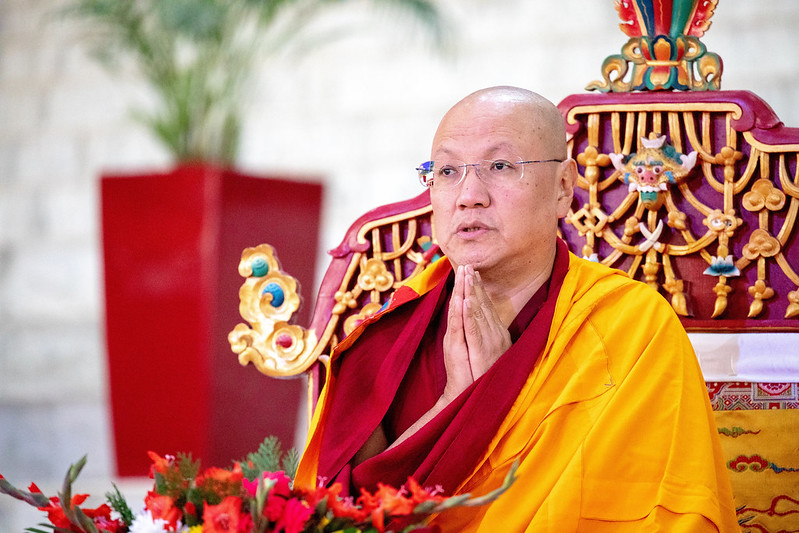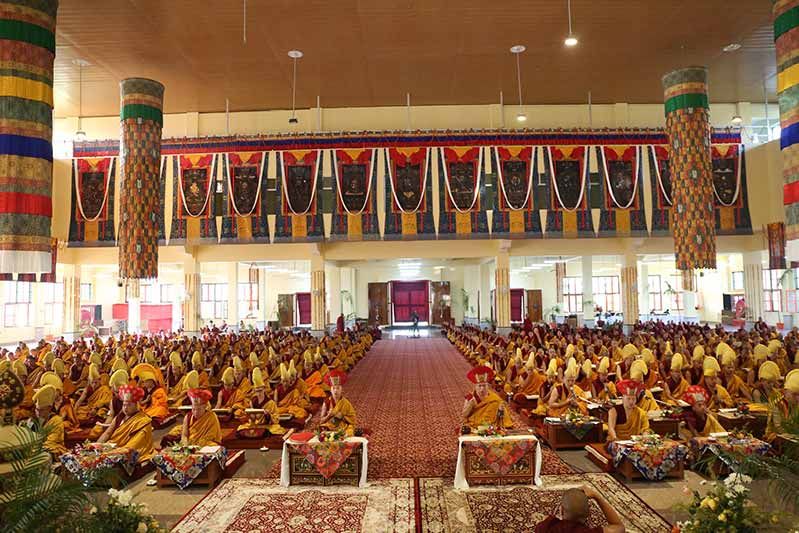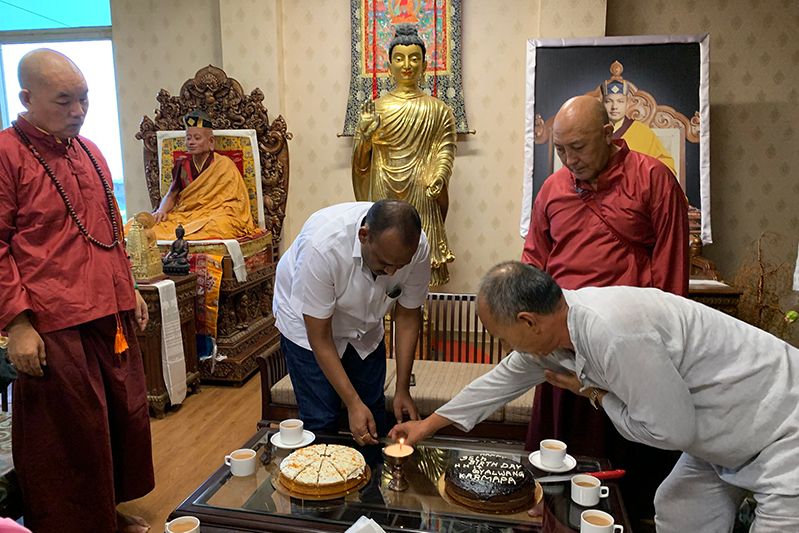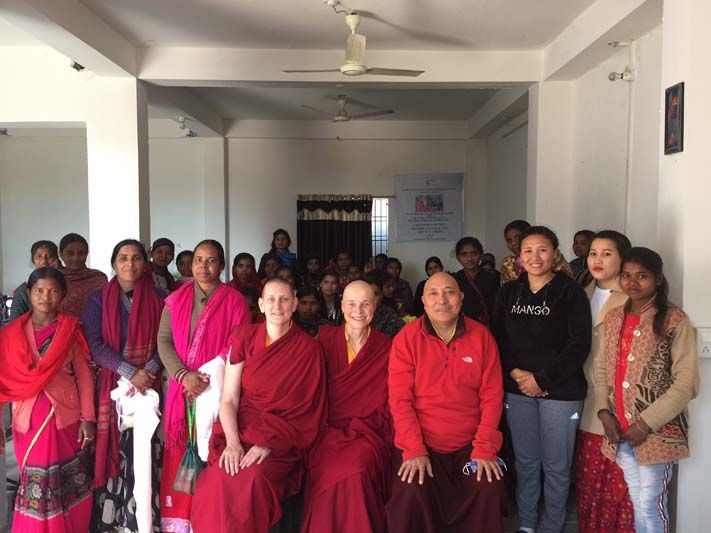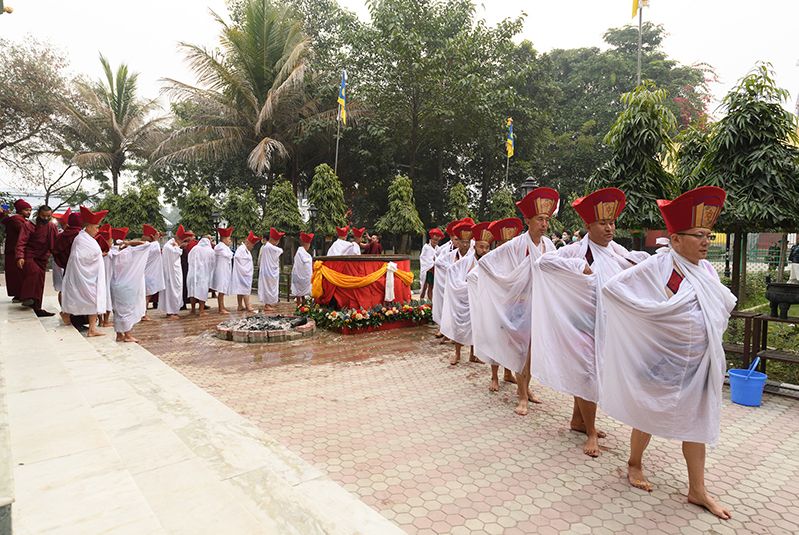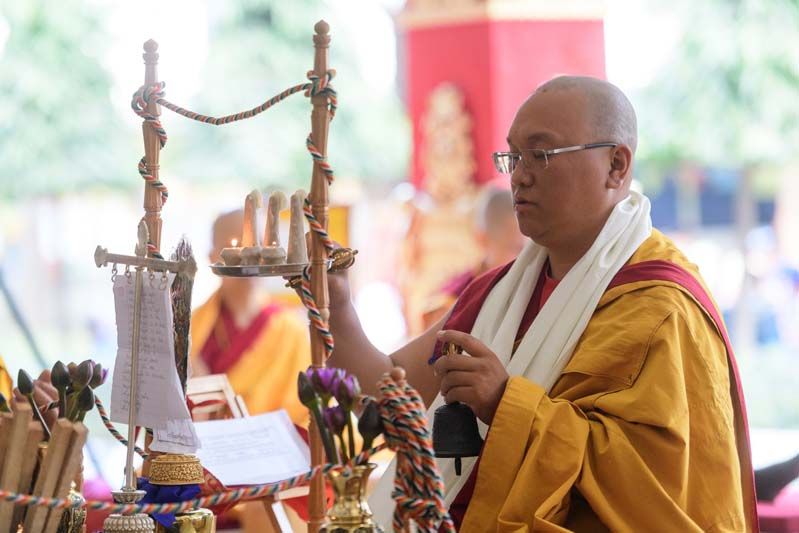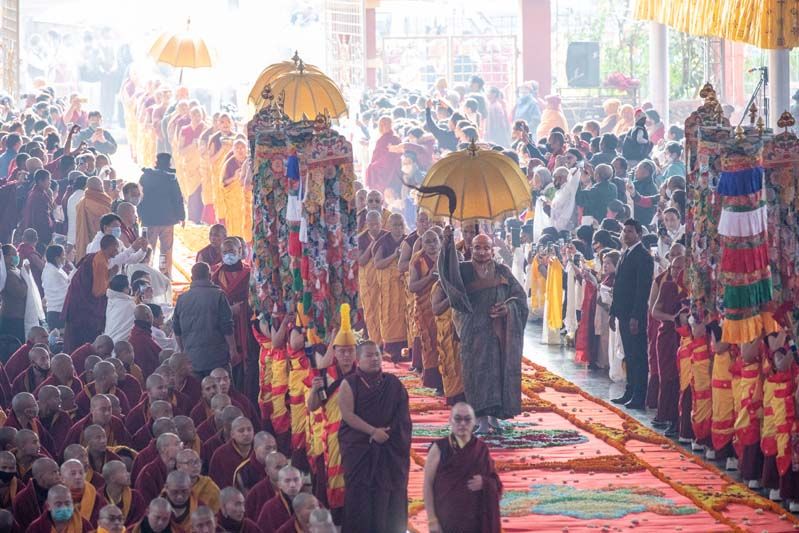Tilopa’s Ganges Mahāmudrā Session One: Mahāmudrā cannot be shown
- January 9, 2019
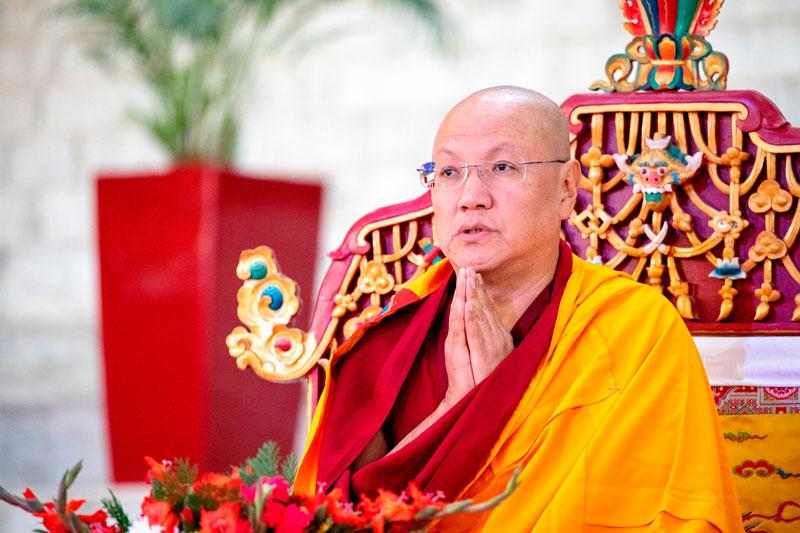
Monlam Pavillion, Bodhgaya
I, Tilo, have nothing to show you. Mahāmudrā cannot be shown.
Over a thousand years ago on the banks of the river Ganges, the Mahasiddha Tilopa offered the pith instructions on Mahāmudrā to his heart son Naropa. Not only had Naropa been the greatest scholar at Nalanda university but he had endured 12 years of inconceivable hardship following every ‘crazy’ command of his guru. The pith instructions of 29 quintessential verses spoken on the essence of non- meditation, flowed spontaneously, like the Ganges, from the ultimate realization of the supremely enlightened master. It is said that after Naropa heard these verses he fainted and when he revived, the enlightenment of Tilopa had merged with his mind. He had attained liberation entirely through devotion, seeing the guru as a Buddha, without a moment of meditation practice. In the 11th century the great Tibetan translator Marpa, to whom the lineage was passed, translated and edited the verses at Phullahari in the presence of Naropa.
The Ganges Mahāmudrā, as it came to be known, has accumulated an almost mythic reputation over the centuries as a classic ‘ear whispered’ pointing out. The guru has to reveal the essence at the right time in the right place to the right student. Pith instruction depends on experiential realization and is thus rarely given.
H.E. Kyabje 10th Sangye Nyenpa Rinpoche consented to illuminate this seldom taught text after being asked three times by His Holiness Karmapa. He interrupted the teachings he was giving in Bhutan to drive 25 hours to Bodhgaya, where he delivered a spontaneous commentary with great enthusiasm and passion to a rapt audience of more than 7000 monks and laypeople.
I feel that this opportunity to teach the dharma in Bodhgaya at the request of His Holiness the Gyalwang Karmapa is very fortunate and great merit for me. I felt the joy while meditating. The Karmapa asked me to teach the Ganges Mahāmudrā; I didn’t choose it for myself. However, I can only give a short teaching. The words and meaning have to be unmistaken. To be able to teach the pith instruction of Mahāmudrā we should rest in the luminosity of the basic nature. It’s not like study, not that kind of teaching at all. For me to sit and teach the Mahāmudrā is a sign of how degenerate this time is. In addition to that I have to apologize for sitting on this throne.
"Even if I haven’t received the realization of Mahāmudrā,” Rinpoche continued, “I have had many opportunities to discuss the words. Not just the discussion of the words, I believe I have the blessings of the unbroken lineage which I received from Dilgo Khyentse Rinpoche who received it from the 16th Karmapa. This is a lineage of the practise of mudra not of words."
In this first teaching Rinpoche emphasized the practice lineage, the importance of guru devotion, and the meaning of Mahāmudrā. Serving the guru in the same way as Naropa was able to serve Tilopa, Milarepa served Marpa, and Gampopa served Milarepa means we are seeing the guru as the actual Buddha. "We have to get to that level of wisdom ourselves."
The pith instructions strike the point, he explained. They change the way we think. Pith instructions happen when a guru like Tilopa attains the state of Mahāmudrā. His Vajra words coming from experiential realization, flow without stopping. This self-aware wisdom transcends the path of words.
"Uphold your lineage means to uphold the practice of Mahāmudrā. Incorporate it into your being, develop realization. Listening contemplating and meditating is the offering of practice. Material offerings are the least of the offerings."
Sangye Rinpoche then gave an introduction to the Mahāmudrā.
The Unaltered ordinary mind is what we don’t recognize. When we recognize that all thoughts are the display of the mind, then we can recognize the nature of mind. That is the basic meaning of Mahāmudrā.
There is no need to change the naturally pure mind. Nothing to remove, nothing to add, nothing to engage, nothing new to be created, nothing to eliminate. All these concepts are projections of a dualistic mind. Suchness is the natural state of sentient beings, the original basis, unaltered, fresh, self-arisen awareness. Suchness is the way things exist. The nature left alone, is as it is. There is no difference between buddhas and sentient beings; the seed is the same in all. Recognise the nature as it is. When a yogi practices Mahāmudrā, the natural state becomes manifest.
There are no faults that are truly existent by their nature. If they did truly exist it would be impossible to eliminate the stains. The stains do not affect the nature. Pith instructions directly point it out. There is nothing to remove. Realizing they do not exist by their own nature is liberation.
Do not mentally engage the ineffable mind.
Rest in the nature as it is, in equipoise as it is. The basis to practice is to cut through the root of samsara and nirvana. Pith instructions are to bring the practice into ourselves. The basis of the mind has never been affected by the afflictions. There is no samsara that needs to be removed and no nirvana that needs to be taken up. The nature of how it actually is, is ineffable, indescribable. Dualistic thoughts are unable to realize it. The nature transcends dualistic mind. Do not mentally engage the ineffable-ness. The nature of mind transcends thoughts.
We need to meditate on ordinary mind. Unaltered, not affected by hopes and fears, not made up, that nature is unexcelled. We don’t know how to recognize it. We are attached to some things and have aversion to other things. When we talk about nature of mind it means the unaltered nature of mind. No need to change the naturally pure mind. It has never been deluded. By not knowing this, we are confused. If we recognise that, all thoughts are like waves. If we know how to sustain the nature of the mind when we have thoughts, there is no confusion. That nature of the mind is Mahāmudrā.
Nothing to remove, nothing to add, no fixation, the nature is unmoving.
The nature of mind is unaffected by conditions. It’s not affected by anything coarse or subtle. The internal nature never moves. It is not stained by faults. The luminous nature of mind is like space. Luminosity is the basis, like the sun. Now we follow our fixations on the object but the luminous nature stays as it is. The basic nature is like the trees on a mountain, no matter how hard the wind blows the mountain on which they are growing is not moved. Similarly, thoughts create samsara but it cannot change the nature of mind.
Letting things be as they are is ‘Cha’, the wisdom of emptiness. ‘Gya’ is liberation from samsaric phenomena, from concept.
The clear empty nature of mind seals or stamps all. Nothing is greater than the great seal. The essence is empty, the nature is luminous, and that seals all phenomena of samsara and nirvana. Mahāmudrā is Prajñaparamita, the great mother who gives birth to all the buddhas. ‘Cha’ is the wisdom of emptiness. It’s pure by its own nature. It’s not the conventional wisdom of the philosophical schools, whether something exists or doesn’t exist. That is created by dualistic mind. In the pith instructions truth is experienced by the yogi’s direct wisdom resting in equipoise. What the yogic mind sees is the ultimate truth. All dualistic conceptions are pacified. Rest in equipoise and find that nature. Things exist only relatively not ultimately.
The moving mental consciousness is ignorance. It is the foundation for karma and samsara. It is the first link of the 12 links of interdependence of samsara. If we can free that, we are liberated. When we don’t recognize the internal moving mind, that is samsara, according to Milarepa. Formation comes because of ignorance. If we realize it, then it becomes discriminating self-aware wisdom. Resting in equipoise, all the qualities will manifest. The Buddha cannot teach it in words.
The first line of Tilopa’s teaching: "I prostrate to the glorious Vajra dakini". Vajra refers to method. Dakini is prajña. Dakini means sky goers, that is, emptiness, the base of all phenomena. It doesn’t refer to the female. Dakini is emptiness, Vajra is the means, unchanging and indestructible.
In these 2 words are included all of ground path and fruition. The Ganges Mahāmudrā teaches the way it is.
The first verse: The pledge to give the pith instruction
Intelligent Naropa, who endures hardship,
Respects the guru and bears suffering.
You who are fortunate, take this to heart.
The vessel or disciple has to have 4 qualities.
- Endure hardship for the sake of dharma. Courage and fortitude to rest in equipoise
- Respect the guru see him as the buddha
- Bear suffering
- Intelligence.
Prajña is the main attribute. We have to recognise the afflictions. By the power of prajña we can understand the nature of things as they are. Understanding develops faith. If we don’t know this, it’s like torturing ourselves. We need it to pacify our afflictions, our thoughts. We need prajña to develop enthusiasm for enduring hardship, which leads to respect for the guru.
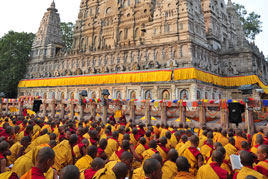
37th Kagyu Monlam Schedule
Tibetan / English / Chinese • French • German • Indonesian • Korean • Polish • Russian • Spanish • Vietnamese
Dharma Teachings
 Meditation Instructions
Meditation Instructions
Recorded during the 37th Kagyu Monlam, Bodhgaya, India. January 28-30, 2020.
